Eve Fishers' recent blog titled, "Peace, the Elusive" was so thought-provoking that it has prompted me to pen something along the same lines. In her excellent article she addressed the painful issues of both violence and it's impact, and the rage that she, herself, carries and how she deals with it. And she deals with it in a very constructive way--she works with convicts on this very issue within prison walls. A bold and a brave choice, in my opinion.
I can certainly relate to her anger when confronted with violence in all it's many manifestations, criminal, political, and domestic. Violence is a baffling, terrifying, and life-changing (or ending) event for most people. It's effects ripple outwards from its central act to touch and poison many, many lives. It's a gift that keeps on giving. Sometimes for generations.
As a child, I grew up in an environment that allowed for a good deal of it. As Eve pointed out, boys of my era were encouraged to stand up for themselves, and that often meant fighting. And we did. I literally cannot recall how many fist fights I was in as a kid. The majority were fairly harmless and were mostly wrestling matches with a few punches thrown in. Others were more serious. This was generally because the stakes were higher--personal honor (being called a liar, or a coward, could not go unanswered), or slandered family members (things could get ugly with this one, and sometimes led to fathers duking it out in the street--no kidding). In some instances, when friends or brothers had been beaten up in an unfair fight (two on one, older and bigger kids, ambush, rocks, etc.) a similar response was crafted and executed. I planned, plotted, participated, and sometimes excelled in these endeavors… and I hated it. The only time I ever felt remotely right during all this was when standing up to a bully; an older kid who was picking on me, or my friends. Even then, I dreaded physical violence. Yet, there seemed no end to it.
There were fights at home, fights at school, fights on the way to school; fights on the way back. There were fights at parties, fights with friends, fights with enemies, and fights with strangers. I was jumped walking down the street– more than once. Being in the wrong place, with the wrong person, looking wrong, looking at someone wrong, or being friends with someone wrong, could all lead to blows. Whether I won, or lost, I was miserable… and angry. Fathers beat mothers and kids, siblings fought, neighborhood kids fought, and sometimes they fought kids from other neighborhoods. Sometime there was murder.
Then, as I grew up, I realized that to a greater, or lesser, degree, that this was happening all over the world. I remained angry. As a young man, an older friend, who would later be my son's godfather, said words to the effect of, "You can't make everything better, because you can't control everything. It's not all about you, and doesn't depend on you. You can only control yourself. And that takes work, and discipline. Just worry about making your little part of the world better, and the world will be better for it… but not perfect. Never perfect." He was wise, which is one of the reasons he godfathered my only son.
Years later, long after I had been a soldier and then a police officer for many years, I found myself in the confessional telling my priest how I sometime longed to do violence against my fellow man; just as when I had been a boy. Without going into the theological details, he offered me this: Forgive those you most don't want to forgive, and forgive yourself. Not just because it is what we are taught as Catholics, but because it is the only thing that can set you free and give you any peace. So long as you rage against the violence in others, you stir the violence within yourself. Forgive, and violence starves to death.
I suspect most of us on this site can, on one level or another, relate to my experiences. One of the hardest things in life to reconcile is that many people are not like us. And I'm not talking about color, religion, race, or creed, but behavior. They choose to do what is wrong, or certainly what we consider wrong. In some instances it is a result of what they have been exposed to, in others what they believe to be correct and right. In all cases it infuriates us that they cannot see what we see; believe what we believe, especially when it comes to violence. But they don't, and probably never will. It doesn't mean that we should cease trying to make a difference, on the contrary, it is important to always try, I think. Yet we can only control so much, hence the anger. Free will has bedeviled us since man first stood upright, yet without it, and all its demons, everything becomes meaningless.
Finally, in a comment by Janice Law on Eve's blog, she challenged us as writers to do something meaningful when dealing with the subject . That is a worthwhile challenge, and who knows, by doing so we may make some small, but important, difference in the world. It matters.
Showing posts with label Eve Fisher. Show all posts
Showing posts with label Eve Fisher. Show all posts
01 July 2014
19 June 2014
The Pure Young Men
by Eve Fisher
"Squeamishness is not a woman's virtue." - Colette, Earthly Paradise, p. 92
 One of the main differences between men and women is that men are far more fastidious. There is nothing quite so pure as a pure-minded man: but then, he can afford to be. It's women who have to deal with a constantly recurring emission of blood and other fluids, and when the babies come it only gets worse. Men can ignore all that and turn up their noses. Men can insist on ritual purity. And there have been a lot of pure-minded men, most of them very young, who have made an awful lot of history: Bernard of Clairvaux, Maximilien Robespierre, Henry David Thoreau, and John Muir, to name three.
One of the main differences between men and women is that men are far more fastidious. There is nothing quite so pure as a pure-minded man: but then, he can afford to be. It's women who have to deal with a constantly recurring emission of blood and other fluids, and when the babies come it only gets worse. Men can ignore all that and turn up their noses. Men can insist on ritual purity. And there have been a lot of pure-minded men, most of them very young, who have made an awful lot of history: Bernard of Clairvaux, Maximilien Robespierre, Henry David Thoreau, and John Muir, to name three. And we've all known them. The pure young man is usually attractive, with a childlike air of freedom and joy that's almost irresistible. He is generally obsessively clean. He often does not swear, smoke, or drink - or, if he does, only a little, and always enjoys giving it up. (There are also those full moon nights when he goes on a binge that could, he dimly hopes, ruin his life.) He often likes to go out "into the wild" to pit himself against the forces of Nature, which he sees as a Great Pure Force. (See Thoreau and Chris McCandless.) Most women know that Nature will swat you down like a gnat if she gets the chance, and then wild animals gnaw your bones. But a Pure Young Man sees his death-defying walks into the wild as an initiation, in which he will, somehow, wring from Nature her imprimatur, and he will be made whole and eternal by his quest. (Sir Galahad was also a Pure Young Man.)
And we've all known them. The pure young man is usually attractive, with a childlike air of freedom and joy that's almost irresistible. He is generally obsessively clean. He often does not swear, smoke, or drink - or, if he does, only a little, and always enjoys giving it up. (There are also those full moon nights when he goes on a binge that could, he dimly hopes, ruin his life.) He often likes to go out "into the wild" to pit himself against the forces of Nature, which he sees as a Great Pure Force. (See Thoreau and Chris McCandless.) Most women know that Nature will swat you down like a gnat if she gets the chance, and then wild animals gnaw your bones. But a Pure Young Man sees his death-defying walks into the wild as an initiation, in which he will, somehow, wring from Nature her imprimatur, and he will be made whole and eternal by his quest. (Sir Galahad was also a Pure Young Man.) To go back to that childlike air of freedom and joy - it's so attractive. Except it's too childlike. It's all self-centered, in a way that isn't clear to those around him until they try to hold on to him in some way. Then he leaps away, like an animal from a trap, and that's the way they see human intimacy - and I'm not talking just about sexual. But, with regard to sex, they often don't do that, either, except on full moon nights in leap years. I always pity the young girl who falls for one, because 9 times out of 10 he will be Hamlet to her Ophelia and throw her away with nothing but words to remember him by. (Hamlet was another Pure Young Man.)
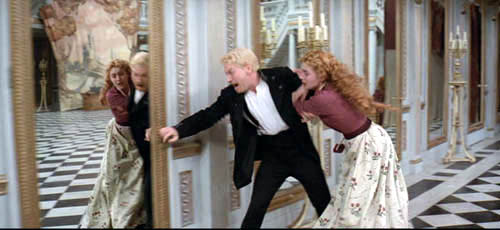
Anyway, Pure Young Men seem to see emotional intimacy as being as messy and defiling and unnecessary as sexual intimacy. They make wonderful friends - if your definition of a friend is someone who will stay up all night talking with you, and put up with whatever food and drink you provide. But if you want someone who will be there when the chips are down, someone who will help you out of a jam - you are going to be in trouble. IF they're still around (they have a nose for trouble and often disappear overnight), they may or may not try to help. But they also may simply not care, and tell you that your concerns are ridiculously petty.
The irony is that I think that they think that they are being a good friend, but they have no idea what that entails. They'll give their money, their material possessions, at the drop of a hat - but usually not to a friend, usually to some homeless person - but they will not give themselves on any terms except their own. They often lie or completely stonewall any questions about themselves, their past, their family, who they are. They are often very lonely. But since their loneliness is an elemental choice, it doesn't reek of that desperation that drives people away. Instead, it can be very attractive. Maybe you'll be the one who will finally crack the barrier, and become their perfect friend. Don't count on it. Their perfect friend is a dog. Or a genie in a bottle with a strong stopper, you can be their friend. The fact that you might need more will never occur to them; and if you bring it up, you will suddenly become possessive, manipulative, violating. You will be canned. Read Into the Wild, and see how often Chris McCandless abandoned friends who loved him.
And yet they're so likeable, so loveable. Probably the very best literary analysis of a Pure Young Man is Peter Pan. Children's story my ass.
Labels:
Eve Fisher,
Galahad,
Henry David Thoreau,
Robespierre
05 June 2014
A Matter of Belief
by Eve Fisher
There's been a lot of talk on-line about a movie called "God's Not Dead" in which an evil atheist professor forces his students to sign a declaration saying "God is Dead" to pass his class. (Of course the Christian hero doesn't and wins the day.) Well, contrary to certain ultra-fundamentalist myths, that doesn't happen. No professor requires anyone to sign anything against their personal beliefs. But we do often require them to learn things that don't necessarily agree with their beliefs and therein hangs a tale.
 When I was teaching World and Asian history at university, I honestly developed a resentment towards certain types of the home-schooled. There was the guy who, when I started talking about Charles Darwin, put down his pencil and refused to take a single note. He didn't care that I wasn't teaching science but history. He didn't care that Social Darwinism was a major part of racism, militarism and WWI. He wasn't going to learn about Darwin. Period. Full-stop.
When I was teaching World and Asian history at university, I honestly developed a resentment towards certain types of the home-schooled. There was the guy who, when I started talking about Charles Darwin, put down his pencil and refused to take a single note. He didn't care that I wasn't teaching science but history. He didn't care that Social Darwinism was a major part of racism, militarism and WWI. He wasn't going to learn about Darwin. Period. Full-stop.
There was another who, when I asked for the connection between the Mexican Revolution and Karl Marx, wrote "Communism is a failed ideology". (By the way, the correct answer is that Mexico claims that its revolution was the first Communist revolution, which it is.) He wrote this for EVERY question about Communism, and I gave him a zero every time. Communism was a huge problem for a number of people, by the way. They just didn't want to have to learn about it, since, after all, the Berlin Wall had fallen, the Empire was destroyed, and Communism was dead. (I'd remind them about China, and sometimes there would be a moment of silence followed by a long sigh as most of them picked their pencils back up. But not all...)

There was always one person who, when I was teaching about Buddhism, Hinduism, Jainism, Islam, etc., had to explain to the class how Christianity was the only true religion. Sometimes they would demand to know my beliefs, and I would say "I'm here to teach history, not proselytize", but they wouldn't get the hint. In fact, they usually decided that I must be an atheist, since I didn't let them preach to the class. That or I was a Roman Catholic, and if you can see the logic to that, please explain it to me.
The connecting thread here is that these people all thought that learning ABOUT something was the same as believing IN it. They really felt that if they learned about a political alternative, like socialism or communism, or a religious alternative, like Buddhism or Islam, they were (1) accepting it, (2) approving it, (3) in danger of becoming it. Even though they had no problem hosing up all the info they could get about Nazis or serial killers. Sometimes they could take it if it was far enough in the past - I could talk paganism till the cows came home, and discuss Plato and Aristotle, Stoicism and Epicureanism. Although they did get a little nervous when I'd point out the points in Platonism and Stoicism that had been adopted by early Christianity...
But, as I said, I developed a resentment. I got so sick of trying to teach them that learning about something outside their comfort zone was not me trying to convert them, but was quite simply trying to get them to understand how the world got the way it is, today. I had to teach them how to learn fearlessly. And in the process, I realized how much the concept of learning about something = believing in something is a wonderful tool to control people. I don't know what these students were being taught at home, but I do know that if you scare people so they won't learn, you can tell them almost anything. You have gotten them to put bars on their own minds, which only makes it harder to ever get them off.

Orwell got these statements straight from Jean Jacques Rousseau's "The Social Contract". But you'd have to have taken notes in my class to know it.
 When I was teaching World and Asian history at university, I honestly developed a resentment towards certain types of the home-schooled. There was the guy who, when I started talking about Charles Darwin, put down his pencil and refused to take a single note. He didn't care that I wasn't teaching science but history. He didn't care that Social Darwinism was a major part of racism, militarism and WWI. He wasn't going to learn about Darwin. Period. Full-stop.
When I was teaching World and Asian history at university, I honestly developed a resentment towards certain types of the home-schooled. There was the guy who, when I started talking about Charles Darwin, put down his pencil and refused to take a single note. He didn't care that I wasn't teaching science but history. He didn't care that Social Darwinism was a major part of racism, militarism and WWI. He wasn't going to learn about Darwin. Period. Full-stop.There was another who, when I asked for the connection between the Mexican Revolution and Karl Marx, wrote "Communism is a failed ideology". (By the way, the correct answer is that Mexico claims that its revolution was the first Communist revolution, which it is.) He wrote this for EVERY question about Communism, and I gave him a zero every time. Communism was a huge problem for a number of people, by the way. They just didn't want to have to learn about it, since, after all, the Berlin Wall had fallen, the Empire was destroyed, and Communism was dead. (I'd remind them about China, and sometimes there would be a moment of silence followed by a long sigh as most of them picked their pencils back up. But not all...)

There was always one person who, when I was teaching about Buddhism, Hinduism, Jainism, Islam, etc., had to explain to the class how Christianity was the only true religion. Sometimes they would demand to know my beliefs, and I would say "I'm here to teach history, not proselytize", but they wouldn't get the hint. In fact, they usually decided that I must be an atheist, since I didn't let them preach to the class. That or I was a Roman Catholic, and if you can see the logic to that, please explain it to me.
The connecting thread here is that these people all thought that learning ABOUT something was the same as believing IN it. They really felt that if they learned about a political alternative, like socialism or communism, or a religious alternative, like Buddhism or Islam, they were (1) accepting it, (2) approving it, (3) in danger of becoming it. Even though they had no problem hosing up all the info they could get about Nazis or serial killers. Sometimes they could take it if it was far enough in the past - I could talk paganism till the cows came home, and discuss Plato and Aristotle, Stoicism and Epicureanism. Although they did get a little nervous when I'd point out the points in Platonism and Stoicism that had been adopted by early Christianity...
But, as I said, I developed a resentment. I got so sick of trying to teach them that learning about something outside their comfort zone was not me trying to convert them, but was quite simply trying to get them to understand how the world got the way it is, today. I had to teach them how to learn fearlessly. And in the process, I realized how much the concept of learning about something = believing in something is a wonderful tool to control people. I don't know what these students were being taught at home, but I do know that if you scare people so they won't learn, you can tell them almost anything. You have gotten them to put bars on their own minds, which only makes it harder to ever get them off.
Orwell got these statements straight from Jean Jacques Rousseau's "The Social Contract". But you'd have to have taken notes in my class to know it.
Labels:
beliefs,
Charles Darwin,
communism,
education,
Eve Fisher,
Karl Marx,
learning,
religions
10 April 2014
Easter is Coming, and My Back's to the Wall
by Eve Fisher
by Eve Fisher
This weekend, I am going to the pen for another weekend workshop. Two weeks from today, when I'm writing this, I will be hosting a massive Easter Feast. Thus, a post with more cooking than writing, and more customs than plot. Oh, well...
Back to the Easter Feast: So far, I expect 11 adults, 4 children, 1 baby, and perhaps 4 more adults coming, but who knows. We just made the spanakopita this morning and put it in the freezer. I have a 7 pound leg of lamb that I'll start thawing around Good Friday, and will stuff with garlic and herbs. My guests - most of whom have been here before - know their jobs, and each bring a wonderful dish, so that I don't have to cook much else but the lamb and the spanakopita, and put out some olives and bread. It's a Greek feast, but we're having it on Tuesday, rather than Sunday, so that more people can come.
 Easter is a huge deal in the Orthodox church. Yes, I know it's a huge deal in every Christian church, or should be, since without the Resurrection, the rest is iffy, to put it mildly. But in the Orthodox church... even my atheist father (a handsome Greek boy, as you can see) demanded red-dyed Easter eggs. In the Orthodox church, Easter is the high holy day of days.
Easter is a huge deal in the Orthodox church. Yes, I know it's a huge deal in every Christian church, or should be, since without the Resurrection, the rest is iffy, to put it mildly. But in the Orthodox church... even my atheist father (a handsome Greek boy, as you can see) demanded red-dyed Easter eggs. In the Orthodox church, Easter is the high holy day of days.
And food is an important part: After 40 days of Lenten fasting - and in the Orthodox church that means no meat, fish, eggs, dairy products of any kind, oil or wine. (Sundays you can have oil and wine.) VERY devout Orthodox abstain entirely from food on Good Friday. (In case you're wondering, I don't do any of this.) And then, after the Holy Saturday midnight service, there is a love feast, and the next day: lamb.
 Leg of Lamb:
Leg of Lamb:
Take a leg of lamb (bone in), and trim of it of any excessive fat.
Cut slits all over it, about an inch or two apart, and in each slit put in salt, a sliver of garlic and/or some herbs (thyme is really good).
Salt and pepper it on the outside and dribble it with olive oil.
Roast at 350 until a meat thermometer reaches about 130 degrees
(should take about 2 1/2 hours for a 7 pound leg)
Spanakopita:
1 package Filo pastry (I buy it frozen; life is too short to make your own)
1 stick of melted butter
2 boxes of cooked frozen chopped spinach OR 2 bunches of fresh spinach, chopped and cooked
Saute - 1 chopped onion and 3 cloves of crushed garlic in olive oil until tender
 Blend - 8 oz. diced or crumbled feta with 2-3 eggs (you want it thick)
Blend - 8 oz. diced or crumbled feta with 2-3 eggs (you want it thick)
mix everything together and set aside.
NOTE: The key to filo pastry is to work FAST. I never let go of the buttering brush until I'm done.
Take an 8x10 or 9/11 sheet-cake pan. (Actually, I use the disposable aluminum sheet pans that you can get 2 for $1.99 for this job.) If you're going to freeze it before you cook it, line it with aluminum foil.
Put 2 sheets of filo in the bottom, brush them with butter, and then start layering the filo pastry, a sheet at a time, with half the sheet hanging over the edge at various angles (you'll fold them in over the filling at the end), buttering the half-sheet in the pan. Build this up into a nice buttered filo pastry lining. Then, when you've used up all the sheets, pour in the filling, and start overlapping and buttering the edges - a sheet at a time - that were hanging outside the pan. (Save a sheet if you need extra coverage at the very center.)
Bake at 350 degrees for an hour. Slice it into squares and serve.
Lamb and spanokopita are universals, but the cookies served depend on what part of Greece you're from. In my grandmother's house, it was kept simple and delicious:
 Koulourakia:
Koulourakia:
1 cup butter, creamed with
1 1/2 cups sugar
ADD - 3 eggs
1 tsp vanilla extract
MIX: 4 cups flour with 1 tbsp. baking powder
Take handful and roll it out into a thin rope (1/4 to 1/2 inch wide), about 6 inches long; then twist them as in the photo. Brush with a milk wash, and bake at 375 degrees until golden brown. (Yes, they crack. They also keep forever in a nice air-tight tin. If you can keep them away from everyone. And they taste great, dunked in tea, coffee, or even a bit of brandy...)
Καλό Πάσχα! (Happy Easter!)
This weekend, I am going to the pen for another weekend workshop. Two weeks from today, when I'm writing this, I will be hosting a massive Easter Feast. Thus, a post with more cooking than writing, and more customs than plot. Oh, well...
Back to the Easter Feast: So far, I expect 11 adults, 4 children, 1 baby, and perhaps 4 more adults coming, but who knows. We just made the spanakopita this morning and put it in the freezer. I have a 7 pound leg of lamb that I'll start thawing around Good Friday, and will stuff with garlic and herbs. My guests - most of whom have been here before - know their jobs, and each bring a wonderful dish, so that I don't have to cook much else but the lamb and the spanakopita, and put out some olives and bread. It's a Greek feast, but we're having it on Tuesday, rather than Sunday, so that more people can come.
 Easter is a huge deal in the Orthodox church. Yes, I know it's a huge deal in every Christian church, or should be, since without the Resurrection, the rest is iffy, to put it mildly. But in the Orthodox church... even my atheist father (a handsome Greek boy, as you can see) demanded red-dyed Easter eggs. In the Orthodox church, Easter is the high holy day of days.
Easter is a huge deal in the Orthodox church. Yes, I know it's a huge deal in every Christian church, or should be, since without the Resurrection, the rest is iffy, to put it mildly. But in the Orthodox church... even my atheist father (a handsome Greek boy, as you can see) demanded red-dyed Easter eggs. In the Orthodox church, Easter is the high holy day of days. And food is an important part: After 40 days of Lenten fasting - and in the Orthodox church that means no meat, fish, eggs, dairy products of any kind, oil or wine. (Sundays you can have oil and wine.) VERY devout Orthodox abstain entirely from food on Good Friday. (In case you're wondering, I don't do any of this.) And then, after the Holy Saturday midnight service, there is a love feast, and the next day: lamb.
Take a leg of lamb (bone in), and trim of it of any excessive fat.
Cut slits all over it, about an inch or two apart, and in each slit put in salt, a sliver of garlic and/or some herbs (thyme is really good).
Salt and pepper it on the outside and dribble it with olive oil.
Roast at 350 until a meat thermometer reaches about 130 degrees
(should take about 2 1/2 hours for a 7 pound leg)
Spanakopita:
1 package Filo pastry (I buy it frozen; life is too short to make your own)
1 stick of melted butter
2 boxes of cooked frozen chopped spinach OR 2 bunches of fresh spinach, chopped and cooked
Saute - 1 chopped onion and 3 cloves of crushed garlic in olive oil until tender
 Blend - 8 oz. diced or crumbled feta with 2-3 eggs (you want it thick)
Blend - 8 oz. diced or crumbled feta with 2-3 eggs (you want it thick)mix everything together and set aside.
NOTE: The key to filo pastry is to work FAST. I never let go of the buttering brush until I'm done.
Take an 8x10 or 9/11 sheet-cake pan. (Actually, I use the disposable aluminum sheet pans that you can get 2 for $1.99 for this job.) If you're going to freeze it before you cook it, line it with aluminum foil.
Put 2 sheets of filo in the bottom, brush them with butter, and then start layering the filo pastry, a sheet at a time, with half the sheet hanging over the edge at various angles (you'll fold them in over the filling at the end), buttering the half-sheet in the pan. Build this up into a nice buttered filo pastry lining. Then, when you've used up all the sheets, pour in the filling, and start overlapping and buttering the edges - a sheet at a time - that were hanging outside the pan. (Save a sheet if you need extra coverage at the very center.)
Bake at 350 degrees for an hour. Slice it into squares and serve.
Lamb and spanokopita are universals, but the cookies served depend on what part of Greece you're from. In my grandmother's house, it was kept simple and delicious:
 Koulourakia:
Koulourakia:1 cup butter, creamed with
1 1/2 cups sugar
ADD - 3 eggs
1 tsp vanilla extract
MIX: 4 cups flour with 1 tbsp. baking powder
Take handful and roll it out into a thin rope (1/4 to 1/2 inch wide), about 6 inches long; then twist them as in the photo. Brush with a milk wash, and bake at 375 degrees until golden brown. (Yes, they crack. They also keep forever in a nice air-tight tin. If you can keep them away from everyone. And they taste great, dunked in tea, coffee, or even a bit of brandy...)
Καλό Πάσχα! (Happy Easter!)
13 March 2014
Robert Benchley, Please Come Home
by Eve Fisher
(We've been out of town, and so, here's a reprint of one of the classic works on how to write, by the master, Robert Benchley.)
 But the fact remains that hundreds of thousands of people throughout the country are wondering how I have time to do all my painting, engineering, writing and philanthropic work when, according to the rotogravure sections and society notes, I spend all my time riding to hounds, going to fancy-dress balls disguised as Louis XIV or spelling out GREETINGS TO CALIFORNIA in formation with three thousand Los Angeles school children. "All work and all play," they say.
But the fact remains that hundreds of thousands of people throughout the country are wondering how I have time to do all my painting, engineering, writing and philanthropic work when, according to the rotogravure sections and society notes, I spend all my time riding to hounds, going to fancy-dress balls disguised as Louis XIV or spelling out GREETINGS TO CALIFORNIA in formation with three thousand Los Angeles school children. "All work and all play," they say.
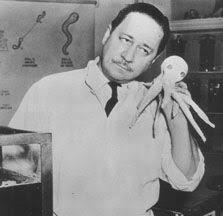 One of the interesting things about the Argyopelius, or[Pg 254] "Silver Hatchet" fish, I find, is that it has eyes in its wrists. I would have been sufficiently surprised just to find out that a fish had wrists, but to learn that it has eyes in them is a discovery so astounding that I am hardly able to cut out the picture. What a lot one learns simply by thumbing through the illustrated weeklies! It is hard work, though, and many a weaker spirit would give it up half-done, but when there is something else of "more importance" to be finished (you see, I still keep up the deception, letting myself go on thinking that the newspaper article is of more importance) no work is too hard or too onerous to keep one busy.
One of the interesting things about the Argyopelius, or[Pg 254] "Silver Hatchet" fish, I find, is that it has eyes in its wrists. I would have been sufficiently surprised just to find out that a fish had wrists, but to learn that it has eyes in them is a discovery so astounding that I am hardly able to cut out the picture. What a lot one learns simply by thumbing through the illustrated weeklies! It is hard work, though, and many a weaker spirit would give it up half-done, but when there is something else of "more importance" to be finished (you see, I still keep up the deception, letting myself go on thinking that the newspaper article is of more importance) no work is too hard or too onerous to keep one busy.
 So, with a perfectly clear conscience, I leave my desk for a few minutes and begin glancing over the titles of the books. Of course, it is difficult to find any book, much less one on snake-charming, in a pile which has been standing in the corner for weeks. What really is needed is for them to be on a[Pg 257] shelf where their titles will be visible at a glance. And there is the shelf, standing beside the pile of books! It seems almost like a divine command written in the sky: "If you want to finish that article, first put up the shelf and arrange the books on it!" Nothing could be clearer or more logical.
So, with a perfectly clear conscience, I leave my desk for a few minutes and begin glancing over the titles of the books. Of course, it is difficult to find any book, much less one on snake-charming, in a pile which has been standing in the corner for weeks. What really is needed is for them to be on a[Pg 257] shelf where their titles will be visible at a glance. And there is the shelf, standing beside the pile of books! It seems almost like a divine command written in the sky: "If you want to finish that article, first put up the shelf and arrange the books on it!" Nothing could be clearer or more logical.
 And so, you see, in two days I have done four of the things I had to do, simply by making believe that it was the fifth that I must do. And the next day, I fix up something else, like taking down the bookshelf and putting it somewhere else, that I have to do, and then I get the fifth one done.
And so, you see, in two days I have done four of the things I had to do, simply by making believe that it was the fifth that I must do. And the next day, I fix up something else, like taking down the bookshelf and putting it somewhere else, that I have to do, and then I get the fifth one done.
Robert Benchley, “How to Get Things Done”
from Chips off the Old Benchley ©1949
A great many people have come up to me and asked me how I manage to get so much work done and still keep looking so dissipated. My answer is "Don't you wish you knew?" and a pretty good answer it is, too, when you consider that nine times out of ten I didn't hear the original question.
The secret of my incredible energy and efficiency in getting work done is a simple one. I have based it very deliberately on a well-known psychological principle and have refined it so that it is now almost too refined. I shall have to begin coarsening it up again pretty soon.
The psychological principle in this: anyone can do any amount of work, provided it isn't the work he is supposed to be doing at that moment.
Let us see how this works out in practice. Let us say that I have five things which have to be done before the end of the week: (1) a basketful of letters to be answered, some of them dating from October, 1928 (2) some bookshelves to be put up and arranged with books (3) a hair-cut to get (4) a pile of scientific magazines to go through and clip (I am collecting all references to tropical fish that I can find, with the idea of some day buying myself one) and (5) an article to write for this paper.
Now. With these five tasks staring me in the face on Monday morning, it is little wonder that I go right back to bed as soon as I have had breakfast, in order to store up health and strength for the almost superhuman expenditure of energy that is to come. Mens sana in corpore sano is my motto, and, not even to be funny, am I going to make believe that I don't know what the Latin means. I feel that the least that I can do is to treat my body right when it has to supply fuel for an insatiable mind like mine.
As I lie in bed on Monday morning storing up strength, I make out a schedule. "What do I have to do first?" I ask myself. Well, those letters really should be answered and the pile of scientific magazines should be clipped. And here is where my secret process comes in. Instead of putting them first on the list of things which have to be done, I put them last. I practice a little deception on myself and say: "First you must write that article for the newspaper." I even say this out loud (being careful that nobody hears me, otherwise they would[Pg 253] keep me in bed) and try to fool myself into really believing that I must do the article that day and that the other things can wait. I sometimes go so far in this self-deception as to make out a list in pencil, with "No. 1. Newspaper article" underlined in red. (The underlining in red is rather difficult, as there is never a red pencil on the table beside the bed, unless I have taken one to bed with me on Sunday night.)
Then, when everything is lined up, I bound out of bed and have lunch. I find that a good, heavy lunch, with some sort of glutinous dessert, is good preparation for the day's work as it keeps one from getting nervous and excitable. We workers must keep cool and calm, otherwise we would just throw away our time in jumping about and fidgeting.
I then seat myself at my desk with my typewriter before me and sharpen five pencils. (The sharp pencils are for poking holes in the desk-blotter, and a pencil has to be pretty sharp to do that. I find that I can't get more than six holes out of one pencil.) Following this I say to myself (again out loud, if it is practical) "Now, old man! Get at this article!"
Gradually the scheme begins to work. My eye catches the pile of magazines, which I have artfully placed on a near-by table beforehand. I write my name and address at the top of the sheet of paper in the typewriter and then sink back. The magazines being within reach (also part of the plot) I look to see if anyone is watching me and get one off the top of the pile. Hello, what's this! In the very first one is an article by Dr. William Beebe, illustrated by horrifying photographs! Pushing my chair away from my desk, I am soon hard at work clipping.
Thus, before the afternoon is half over, I have gone through the scientific magazines and have a neat pile of clippings (including one of a Viper Fish which I wish you could see. You would die laughing). Then it is back to the grind of the newspaper article.
This time I get as far as the title, which I write down with considerable satisfaction until I find that I have misspelled one word terribly, so that the whole sheet of paper has to come out and a fresh one be inserted. As I am doing this, my eye catches the basket of letters.
Now, if there is one thing that I hate to do (and there is, you may be sure) it is to write letters. But somehow, with the magazine article before me waiting to be done, I am seized with an epistolary fervor which amounts to a craving, and I slyly sneak the first of the unanswered letters out of the basket. I figure out in my mind that I will get more into the swing of writing the article if I practice a little on a few letters. This first one, anyway, I really must answer. True, it is from a friend in Antwerp asking me to look him up when I[Pg 255] am in Europe in the summer of 1929, so he can't actually be watching the incoming boats for an answer, but I owe something to politeness after all. So instead of putting a fresh sheet of copy-paper into the typewriter, I slip in one of my handsome bits of personal stationary and dash off a note to my friend in Antwerp. Then, being well in the letter-writing mood, I clean up the entire batch. I feel a little guilty about the article, but the pile of freshly stamped envelopes and the neat bundle of clippings on tropical fish do much to salve my conscience. Tomorrow I will do the article, and no fooling this time either.
When tomorrow comes I am up with one of the older and more sluggish larks. A fresh sheet of copy-paper in the machine, and my name and address neatly printed at the top, and all before eleven A. M.! "A human dynamo" is the name I think up for myself. I have decided to write something about snake-charming and am already more than satisfied with the title "These Snake-Charming People." But, in order to write about snake-charming, one has to know a little about its history, and where should one go to find history but to a book? Maybe in that pile of books in the corner is one on snake-charming! Nobody could point the finger of scorn at me if I went over to those books for the avowed purpose of research work for the matter at hand. No writer could be supposed to carry all that information in his head.
 So, with a perfectly clear conscience, I leave my desk for a few minutes and begin glancing over the titles of the books. Of course, it is difficult to find any book, much less one on snake-charming, in a pile which has been standing in the corner for weeks. What really is needed is for them to be on a[Pg 257] shelf where their titles will be visible at a glance. And there is the shelf, standing beside the pile of books! It seems almost like a divine command written in the sky: "If you want to finish that article, first put up the shelf and arrange the books on it!" Nothing could be clearer or more logical.
So, with a perfectly clear conscience, I leave my desk for a few minutes and begin glancing over the titles of the books. Of course, it is difficult to find any book, much less one on snake-charming, in a pile which has been standing in the corner for weeks. What really is needed is for them to be on a[Pg 257] shelf where their titles will be visible at a glance. And there is the shelf, standing beside the pile of books! It seems almost like a divine command written in the sky: "If you want to finish that article, first put up the shelf and arrange the books on it!" Nothing could be clearer or more logical.
In order to put up the shelf, the laws of physics have decreed that there must be nails, a hammer and some sort of brackets to hold it up on the wall. You can't just wet a shelf with your tongue and stick it up. And, as there are no nails or brackets in the house (or, if there are, they are probably hidden somewhere) the next thing to do is to put on my hat and go out to buy them. Much as it disturbs me to put off the actual start of the article, I feel that I am doing only what is in the line of duty to put on my hat and go out to buy nails and brackets. And, as I put on my hat, I realize to my chagrin that I need a hair-cut badly. I can kill two birds with one stone, or at least with two, and stop in at the barber's on the way back. I will feel all the more like writing after a turn in the fresh air. Any doctor would tell me that.
So in a few hours I return, spick and span and smelling of lilac, bearing nails, brackets, the evening papers and some crackers and peanut butter. Then it's ho! for a quick snack and a glance through the evening papers (there might be something in them which would alter what I was going to write about snake-charming) and in no time at all the shelf is up, slightly crooked but up, and the books are arranged in a neat row in alphabetical order and all ready for almost instantaneous reference. There does not happen to be one on snake-charming among them, but there is a very interesting one containing some Hogarth prints and one which will bear even[Pg 258] closer inspection dealing with the growth of the Motion Picture, illustrated with "stills" from famous productions. A really remarkable industry, the motion-pictures. I might want to write an article on it sometime. Not today, probably, for it is six o'clock and there is still the one on snake-charming to finish up first. Tomorrow morning sharp! Yes, sir!
The only trouble is that, at this rate, I will soon run out of things to do, and will be forced to get at that newspaper article the first thing Monday morning.
THE END
Labels:
Eve Fisher,
procrastination,
Robert Benchley,
tips,
writer's block,
writers
27 February 2014
Tales Around the Fireside
by Eve Fisher
I am a short story writer. Yes, I've written two novels, one (The Best is Yet to Be) as part of the Guideposts mystery series, "Mystery and the Minister's Wife", the other a sci-fi/fantasy piece that is still sitting in my closet. I've written plays. I used to write songs for myself and, later, a Southern rock-and-roll band called "Fantasy's Hand." (Those were fun days...) But what I really feel most comfortable with is short stories.
I think a lot of this comes from my childhood. I was an only child, and my parents were 40 when they adopted me; everyone around me was (it seemed) at least 40 years older than me, and back then children were expected to keep their mouths shut and just be there while the adults talked, talked, talked. Luckily for me, most of them were storytellers. A story, told in the night, to make you sigh or smile or shiver... still pretty much the ideal.
And I like reading short stories. I don't understand why so few magazines carry short stories anymore. Why there are so few short-story magazines. (Especially considering that attention spans seem to be growing shorter and shorter all the time, but that's another rant.) I love them. And some of the finest writing anywhere has been done in that format. Here are my picks for some of the greatest short story writers:
John Collier. "Fancies and Goodnights" contains some of his best work. (It won the Edgar Award in 1962.) Read "Bottle Party" to find out what really happens with a genie in the bottle. "The Chaser" - on how tastes change over time. "If Youth Knew What Age Could"... One of my favorites, "The Lady on the Grey." And on and on. Many of his stories were adapted for Alfred Hitchcock Presents and Tales of the Unexpected. He also wrote screenplays (including "Sylvia Scarlett", [uncredited] "The African Queen", and "I am A Camera"), and a couple of novels of which my favorite is the mordant, devilish, unforgettable "His Monkey Wife."
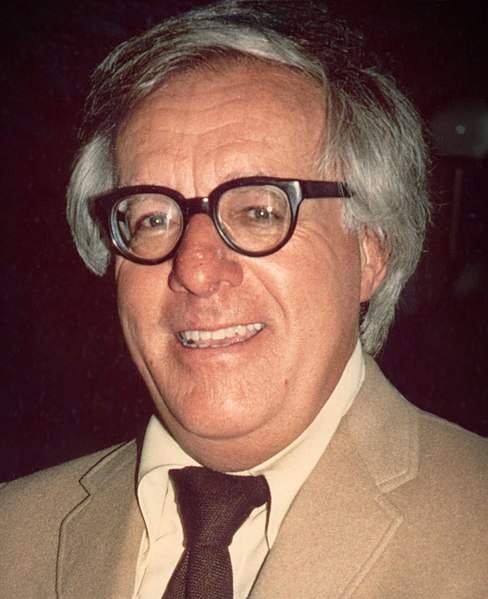 Ray Bradbury. There are not enough words in the English language to praise his amazing output of short stories. From "The Fruit in the Bottom of the Bowl" to "I Sing the Body Electric," "April Witch" to "The Veldt", "A Sound of Thunder" to the heartbreaking "There Will Come Soft Rains", "Dark They Were and Golden Eyed", the whole body of "The Martian Chronicles", and on and on, I gobbled each and every one of his stories I could get my hands on. His work inspired me, amazed me, touched me... couldn't get enough of it. And he was primarily a short-story writer: aside from "Fahrenheit 451", his other novels didn't really gel for me. ("The Martian Chronicles" is a collection of short stories, with a narration in between.) He showed what could be done in the medium of short fiction. And, of course, he was a regular writer for "Twilight Zone" and other TV shows...
Ray Bradbury. There are not enough words in the English language to praise his amazing output of short stories. From "The Fruit in the Bottom of the Bowl" to "I Sing the Body Electric," "April Witch" to "The Veldt", "A Sound of Thunder" to the heartbreaking "There Will Come Soft Rains", "Dark They Were and Golden Eyed", the whole body of "The Martian Chronicles", and on and on, I gobbled each and every one of his stories I could get my hands on. His work inspired me, amazed me, touched me... couldn't get enough of it. And he was primarily a short-story writer: aside from "Fahrenheit 451", his other novels didn't really gel for me. ("The Martian Chronicles" is a collection of short stories, with a narration in between.) He showed what could be done in the medium of short fiction. And, of course, he was a regular writer for "Twilight Zone" and other TV shows...
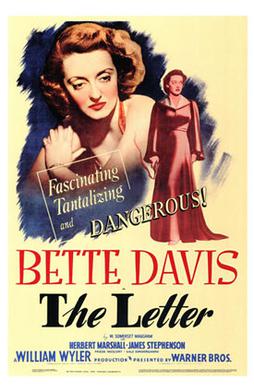
Somerset Maugham. One of the few who could write both great novels, and great short stories. "The Letter" - made into film twice, most notably with Bette Davis as the cool and collected murderess. "The Lotus Eater" - when Paradise runs out... "Red" - what really happens when you look up your old childhood sweetheart... "The Luncheon" - never ask questions you can't take the answer to... The hilarious "Three Fat Women of Antibes", "The Vessel of Wrath", "The Verger"... and, of course, the "Ashenden" series which practically began secret agent stories. (Alfred Hitchcock combined "The Hairless Mexican" and "The Traitor" into the 1936 movie "Secret Agent" with John Gielgud and Peter Lorre.) Seriously, his short stories are like popcorn at the movies - once I start reading them (I have a four-volume set), I can't quit until I've worked my way through... way too many.
H. P. Lovecraft, Edgar Allan Poe, and Shirley Jackson. And how do you want to be scared today, my precious? My sweets? By many-tentacled horrors from beyond space, or by crumbling ruins of decay and death, or the quiet malevolence of a quiet house or neighborhood? By the breathing darkness or that strange emptiness? By the sudden creak or that high whistle in the depths? Any of these will leave you wondering what's really going on next door, when you'll be able to turn the lights off again, and what is that sound in the closet or over head or under the floor...
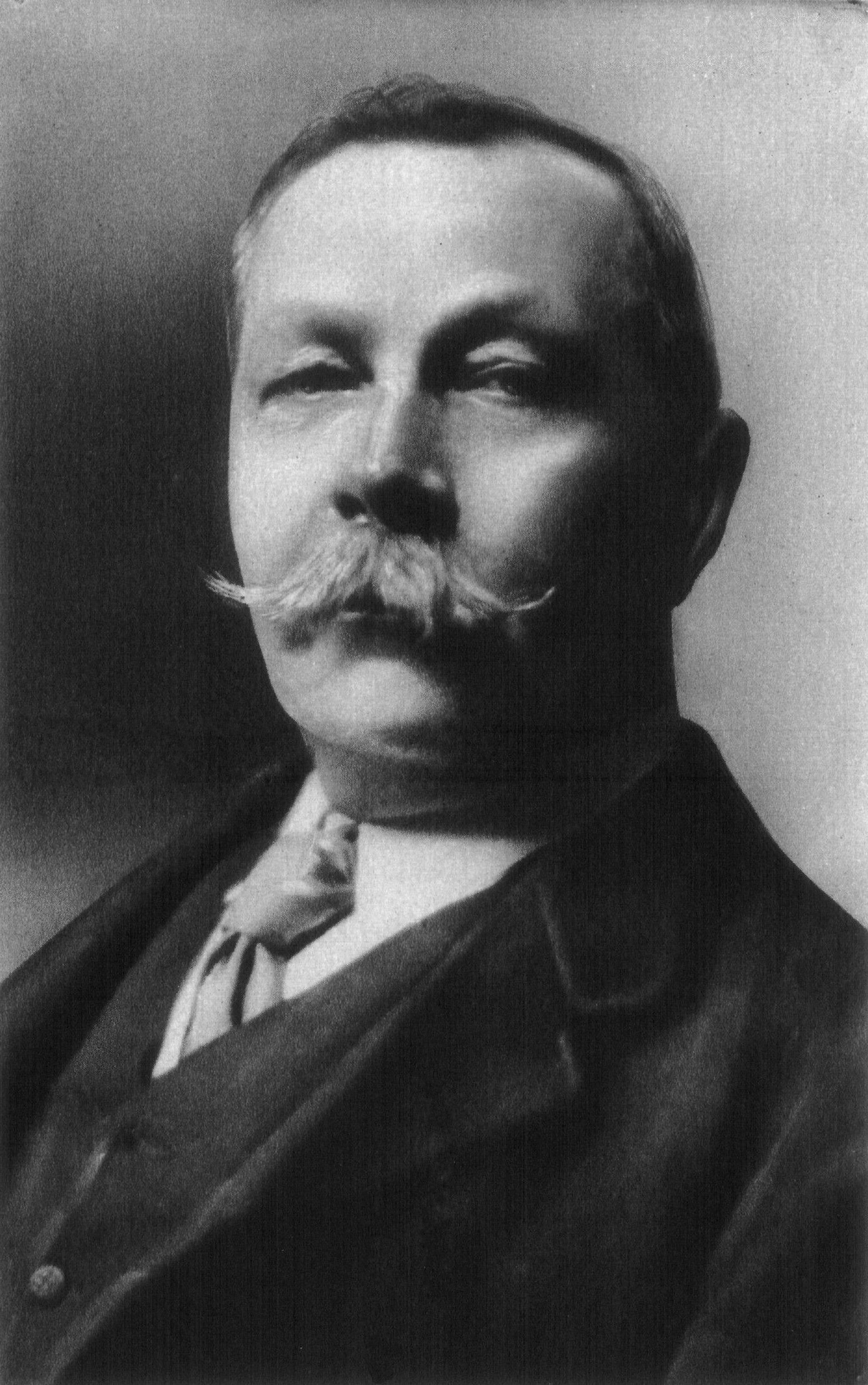 Arthur Conan Doyle. Let us never forget that 90% of the Memoirs of Dr. John H. Watson about his inimitable companion, Sherlock Holmes, are short stories. We all have our favorites. (Sadly, the relentless reinterpretations of Holmes and Adler have reduced my pleasure in "A Scandal in Bohemia".) Among mine are "The Adventure of the Copper Beeches", "The Speckled Band", "The Greek Interpreter", "The Devil's Foot", and "The Norwood Builder". I have spent many a rainy afternoon curled up in a couch with a hot cup of tea and my father's one-volume "Complete Works", reading, reading, reading, time travelling to Victorian/Edwardian London, as Sherlock Holmes - the world's only private consulting detective - solves case after case after case... Ah... Excuse me, I have some reading to do...
Arthur Conan Doyle. Let us never forget that 90% of the Memoirs of Dr. John H. Watson about his inimitable companion, Sherlock Holmes, are short stories. We all have our favorites. (Sadly, the relentless reinterpretations of Holmes and Adler have reduced my pleasure in "A Scandal in Bohemia".) Among mine are "The Adventure of the Copper Beeches", "The Speckled Band", "The Greek Interpreter", "The Devil's Foot", and "The Norwood Builder". I have spent many a rainy afternoon curled up in a couch with a hot cup of tea and my father's one-volume "Complete Works", reading, reading, reading, time travelling to Victorian/Edwardian London, as Sherlock Holmes - the world's only private consulting detective - solves case after case after case... Ah... Excuse me, I have some reading to do...
NOTE: These are, of course, only a few of the many tremendous short-story writers I've read. Flannery O'Connor, Guy de Maupassant, Rudyard Kipling, Roald Dahl, Daphne du Maurier ("The Birds", yes - but never forget "The Little Photographer"), Nikolai Gogol and Anton Chekhov, Ursula LeGuin and Isaac Asimov, and so many of my esteemed colleagues... I really do have some reading to do!
I think a lot of this comes from my childhood. I was an only child, and my parents were 40 when they adopted me; everyone around me was (it seemed) at least 40 years older than me, and back then children were expected to keep their mouths shut and just be there while the adults talked, talked, talked. Luckily for me, most of them were storytellers. A story, told in the night, to make you sigh or smile or shiver... still pretty much the ideal.
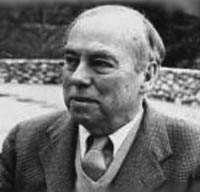 |
| John Collier |
And I like reading short stories. I don't understand why so few magazines carry short stories anymore. Why there are so few short-story magazines. (Especially considering that attention spans seem to be growing shorter and shorter all the time, but that's another rant.) I love them. And some of the finest writing anywhere has been done in that format. Here are my picks for some of the greatest short story writers:
John Collier. "Fancies and Goodnights" contains some of his best work. (It won the Edgar Award in 1962.) Read "Bottle Party" to find out what really happens with a genie in the bottle. "The Chaser" - on how tastes change over time. "If Youth Knew What Age Could"... One of my favorites, "The Lady on the Grey." And on and on. Many of his stories were adapted for Alfred Hitchcock Presents and Tales of the Unexpected. He also wrote screenplays (including "Sylvia Scarlett", [uncredited] "The African Queen", and "I am A Camera"), and a couple of novels of which my favorite is the mordant, devilish, unforgettable "His Monkey Wife."
 Ray Bradbury. There are not enough words in the English language to praise his amazing output of short stories. From "The Fruit in the Bottom of the Bowl" to "I Sing the Body Electric," "April Witch" to "The Veldt", "A Sound of Thunder" to the heartbreaking "There Will Come Soft Rains", "Dark They Were and Golden Eyed", the whole body of "The Martian Chronicles", and on and on, I gobbled each and every one of his stories I could get my hands on. His work inspired me, amazed me, touched me... couldn't get enough of it. And he was primarily a short-story writer: aside from "Fahrenheit 451", his other novels didn't really gel for me. ("The Martian Chronicles" is a collection of short stories, with a narration in between.) He showed what could be done in the medium of short fiction. And, of course, he was a regular writer for "Twilight Zone" and other TV shows...
Ray Bradbury. There are not enough words in the English language to praise his amazing output of short stories. From "The Fruit in the Bottom of the Bowl" to "I Sing the Body Electric," "April Witch" to "The Veldt", "A Sound of Thunder" to the heartbreaking "There Will Come Soft Rains", "Dark They Were and Golden Eyed", the whole body of "The Martian Chronicles", and on and on, I gobbled each and every one of his stories I could get my hands on. His work inspired me, amazed me, touched me... couldn't get enough of it. And he was primarily a short-story writer: aside from "Fahrenheit 451", his other novels didn't really gel for me. ("The Martian Chronicles" is a collection of short stories, with a narration in between.) He showed what could be done in the medium of short fiction. And, of course, he was a regular writer for "Twilight Zone" and other TV shows...
Somerset Maugham. One of the few who could write both great novels, and great short stories. "The Letter" - made into film twice, most notably with Bette Davis as the cool and collected murderess. "The Lotus Eater" - when Paradise runs out... "Red" - what really happens when you look up your old childhood sweetheart... "The Luncheon" - never ask questions you can't take the answer to... The hilarious "Three Fat Women of Antibes", "The Vessel of Wrath", "The Verger"... and, of course, the "Ashenden" series which practically began secret agent stories. (Alfred Hitchcock combined "The Hairless Mexican" and "The Traitor" into the 1936 movie "Secret Agent" with John Gielgud and Peter Lorre.) Seriously, his short stories are like popcorn at the movies - once I start reading them (I have a four-volume set), I can't quit until I've worked my way through... way too many.
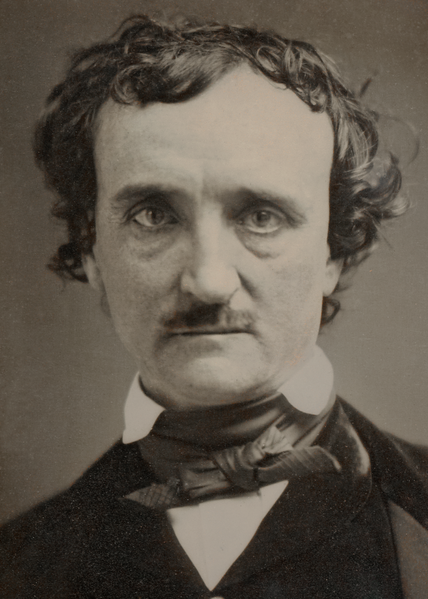 |
| Poe |
 |
| Lovecraft |
 |
| Jackson |
 Arthur Conan Doyle. Let us never forget that 90% of the Memoirs of Dr. John H. Watson about his inimitable companion, Sherlock Holmes, are short stories. We all have our favorites. (Sadly, the relentless reinterpretations of Holmes and Adler have reduced my pleasure in "A Scandal in Bohemia".) Among mine are "The Adventure of the Copper Beeches", "The Speckled Band", "The Greek Interpreter", "The Devil's Foot", and "The Norwood Builder". I have spent many a rainy afternoon curled up in a couch with a hot cup of tea and my father's one-volume "Complete Works", reading, reading, reading, time travelling to Victorian/Edwardian London, as Sherlock Holmes - the world's only private consulting detective - solves case after case after case... Ah... Excuse me, I have some reading to do...
Arthur Conan Doyle. Let us never forget that 90% of the Memoirs of Dr. John H. Watson about his inimitable companion, Sherlock Holmes, are short stories. We all have our favorites. (Sadly, the relentless reinterpretations of Holmes and Adler have reduced my pleasure in "A Scandal in Bohemia".) Among mine are "The Adventure of the Copper Beeches", "The Speckled Band", "The Greek Interpreter", "The Devil's Foot", and "The Norwood Builder". I have spent many a rainy afternoon curled up in a couch with a hot cup of tea and my father's one-volume "Complete Works", reading, reading, reading, time travelling to Victorian/Edwardian London, as Sherlock Holmes - the world's only private consulting detective - solves case after case after case... Ah... Excuse me, I have some reading to do...NOTE: These are, of course, only a few of the many tremendous short-story writers I've read. Flannery O'Connor, Guy de Maupassant, Rudyard Kipling, Roald Dahl, Daphne du Maurier ("The Birds", yes - but never forget "The Little Photographer"), Nikolai Gogol and Anton Chekhov, Ursula LeGuin and Isaac Asimov, and so many of my esteemed colleagues... I really do have some reading to do!
02 January 2014
The Prisoner of the Riviera
by Eve Fisher
First of all, meet Janice Law:
 No, not that one, this one:
No, not that one, this one: 

Francis Bacon, artist. Francis Bacon, gambler. Francis Bacon, bon vivant. Francis Bacon, gay, asthmatic, Irish, auto-didact, devoted to his Nanny (who lived with him until her death in 1951), and an absolute mess (his studio, by all accounts, was like something out of "Hoarders"). Francis Bacon, who must be howling over the whopping 142 million pounds paid for his portrait of Lucian Freud last year (the most ever paid for any work of art), especially since he never made anything like that sum in his life, despite his taste for high low life. Let's just say the boy lived above his means, and that's part of what gets him in trouble.
Especially in Janice Law's "The Prisoner of the Riviera", the second of her Francis Bacon series (and if you have not yet read "The Fires of London", go and get it immediately). Francis is back, in all his dark, louche, sardonic, hungry, artistic, reckless glory.
Did I mention he's a gambler? Well, in post-WW2 Britain, it's practically the only fun you can have (all right, there is Albert, his lover...), but Francis' luck hasn't been good. And it doesn't improve when he sees a Frenchman shot in front of him as he and Albert head home. Francis leaps to help, but the man - Monsieur Renard - dies. And then Joubert, the owner of the gambling den, makes Francis an offer he can't refuse: take a package to Madame Renard on the Riviera. In exchange, all of Francis' gambling debts will be forgiven. Well, Francis' debts are high, and he and Albert and Nan had already planned to go to Monte Carlo for a vacation ("A solemn promise, dear boy"), so why not. So off they go, Francis, Albert, and Nan, to eat and drink and gamble and relax in the sun and, eventually, fulfill his commission...
 Now, to those of us who know our French fairytales, the name Renard hints that this is not going to be all pate de foie gras and Chateau Lafite, although Francis does his best to consume as much of the good stuff as he can. And indeed, when Francis (eventually) goes to fulfill his commission on a hot, lazy, dusty day, things go south remarkably quickly. The house is sinister, the widow unusual, and two thugs seem to be following him with ill intent. Two days later, he is the prime suspect in the murder of Madame Renard - after all, everyone knows that a foreigner, especially a British foreigner, would be the obvious suspect in a small resort town - even though the dead woman does not look at all like the Madame Renard to whom he handed that mysterious package... And the package has disappeared. And "Renard" used to be the codeword for various operations, some of which had to do with the Resistance... And everyone wants him to "help" them with their inquiries - licit or illicit. Thankfully, the food is good, the wine is wonderful, and Pierre the bicyclist is delightful... until all hell breaks loose. Again.
Now, to those of us who know our French fairytales, the name Renard hints that this is not going to be all pate de foie gras and Chateau Lafite, although Francis does his best to consume as much of the good stuff as he can. And indeed, when Francis (eventually) goes to fulfill his commission on a hot, lazy, dusty day, things go south remarkably quickly. The house is sinister, the widow unusual, and two thugs seem to be following him with ill intent. Two days later, he is the prime suspect in the murder of Madame Renard - after all, everyone knows that a foreigner, especially a British foreigner, would be the obvious suspect in a small resort town - even though the dead woman does not look at all like the Madame Renard to whom he handed that mysterious package... And the package has disappeared. And "Renard" used to be the codeword for various operations, some of which had to do with the Resistance... And everyone wants him to "help" them with their inquiries - licit or illicit. Thankfully, the food is good, the wine is wonderful, and Pierre the bicyclist is delightful... until all hell breaks loose. Again.
Francis quickly discovers that he has walked into a world that is just as haunted by World War II as Britain, only differently. The Riviera spent its war occupied by collaborators and resistance, fascists and communists, counterfeiters and criminals, and far too many of them are still there, still feuding, still fighting, still procuring, masquerading, lying, killing... (the bodies are piling up!) And far too many of them want Francis dead.
 "The Prisoner of the Riviera" is a fast-paced ride that has as many twists and turns as a Riviera mountain road. And Francis is just the man to tell the story: witty, sarcastic, honest, an artist whose interest is always in the unusual, a lover who makes no bones about who he is, a man who knows everything about the dark side of life. Read it now, and then wait, breathlessly, for the next installment of Francis Bacon, channeled through Janice Law!
"The Prisoner of the Riviera" is a fast-paced ride that has as many twists and turns as a Riviera mountain road. And Francis is just the man to tell the story: witty, sarcastic, honest, an artist whose interest is always in the unusual, a lover who makes no bones about who he is, a man who knows everything about the dark side of life. Read it now, and then wait, breathlessly, for the next installment of Francis Bacon, channeled through Janice Law!
Secondly, meet Francis Bacon:
 No, not that one, this one:
No, not that one, this one: 

Francis Bacon, artist. Francis Bacon, gambler. Francis Bacon, bon vivant. Francis Bacon, gay, asthmatic, Irish, auto-didact, devoted to his Nanny (who lived with him until her death in 1951), and an absolute mess (his studio, by all accounts, was like something out of "Hoarders"). Francis Bacon, who must be howling over the whopping 142 million pounds paid for his portrait of Lucian Freud last year (the most ever paid for any work of art), especially since he never made anything like that sum in his life, despite his taste for high low life. Let's just say the boy lived above his means, and that's part of what gets him in trouble.
Especially in Janice Law's "The Prisoner of the Riviera", the second of her Francis Bacon series (and if you have not yet read "The Fires of London", go and get it immediately). Francis is back, in all his dark, louche, sardonic, hungry, artistic, reckless glory.
 |
| Monte Carlo Casino |
 Now, to those of us who know our French fairytales, the name Renard hints that this is not going to be all pate de foie gras and Chateau Lafite, although Francis does his best to consume as much of the good stuff as he can. And indeed, when Francis (eventually) goes to fulfill his commission on a hot, lazy, dusty day, things go south remarkably quickly. The house is sinister, the widow unusual, and two thugs seem to be following him with ill intent. Two days later, he is the prime suspect in the murder of Madame Renard - after all, everyone knows that a foreigner, especially a British foreigner, would be the obvious suspect in a small resort town - even though the dead woman does not look at all like the Madame Renard to whom he handed that mysterious package... And the package has disappeared. And "Renard" used to be the codeword for various operations, some of which had to do with the Resistance... And everyone wants him to "help" them with their inquiries - licit or illicit. Thankfully, the food is good, the wine is wonderful, and Pierre the bicyclist is delightful... until all hell breaks loose. Again.
Now, to those of us who know our French fairytales, the name Renard hints that this is not going to be all pate de foie gras and Chateau Lafite, although Francis does his best to consume as much of the good stuff as he can. And indeed, when Francis (eventually) goes to fulfill his commission on a hot, lazy, dusty day, things go south remarkably quickly. The house is sinister, the widow unusual, and two thugs seem to be following him with ill intent. Two days later, he is the prime suspect in the murder of Madame Renard - after all, everyone knows that a foreigner, especially a British foreigner, would be the obvious suspect in a small resort town - even though the dead woman does not look at all like the Madame Renard to whom he handed that mysterious package... And the package has disappeared. And "Renard" used to be the codeword for various operations, some of which had to do with the Resistance... And everyone wants him to "help" them with their inquiries - licit or illicit. Thankfully, the food is good, the wine is wonderful, and Pierre the bicyclist is delightful... until all hell breaks loose. Again. Francis quickly discovers that he has walked into a world that is just as haunted by World War II as Britain, only differently. The Riviera spent its war occupied by collaborators and resistance, fascists and communists, counterfeiters and criminals, and far too many of them are still there, still feuding, still fighting, still procuring, masquerading, lying, killing... (the bodies are piling up!) And far too many of them want Francis dead.
 "The Prisoner of the Riviera" is a fast-paced ride that has as many twists and turns as a Riviera mountain road. And Francis is just the man to tell the story: witty, sarcastic, honest, an artist whose interest is always in the unusual, a lover who makes no bones about who he is, a man who knows everything about the dark side of life. Read it now, and then wait, breathlessly, for the next installment of Francis Bacon, channeled through Janice Law!
"The Prisoner of the Riviera" is a fast-paced ride that has as many twists and turns as a Riviera mountain road. And Francis is just the man to tell the story: witty, sarcastic, honest, an artist whose interest is always in the unusual, a lover who makes no bones about who he is, a man who knows everything about the dark side of life. Read it now, and then wait, breathlessly, for the next installment of Francis Bacon, channeled through Janice Law!
Labels:
Eve Fisher,
Francis Bacon,
French Resistance,
Janice Law
Subscribe to:
Posts (Atom)


